Speech on Syria: Diplomatic Association Dinner, Bacon House, Washington DC, 11th May 2017 – David Alton
I will address three things:
- The contagious spread of the Genocide against Christians and other minorities;
- The need for Realism in combatting Islamist ideology; and
- Upholding the rule of law and Prioritising the safety and future of minorities within the region.
- The contagious spread of the Genocide against Christians and other minorities;
Our entire world is less tolerant and more violent: from Syria, Iraq and the continued rise of the so-called Islamic State, or Daesh, which continues to murder people and eradicate culture and heritage; to the horrors of South Kordofan and Blue Nile, where the Sudanese regime has dropped more than 2,500 bombs on its civilian population; to Boko Haram’s abductions, bombings and murders in Nigeria; to the burning alive of Christians in Pakistan; to the beheading of 21 Copts in Libya and the bombing of their churches and monasteries in Egypt.
In Syria and Iraq the violence goes under the name of genocide and is the worst humanitarian catastrophe of our time, generating the largest movement of displaced people since World War II.
In 2016 Antoine Audo, the Chaldean Bishop of Aleppo, said that two-thirds of Syrian Christians had either been killed or driven away from his country.
Zainab Bangura, the United Nations special representative on sexual violence in conflict, has authenticated reports of Christian and Yazidi females—girls aged one to seven—being sold, with the youngest carrying the highest price tag. One 80-year-old Christian woman who stayed in Nineveh was reportedly burned alive. In another Christian family, the mother and 12 year-old daughter were raped by ISIS militants, leading the father, who was forced to watch, to commit suicide. One refugee described how she witnessed ISIS crucify her husband on the door of their home.
On 23 July 2014, I warned in an opinion piece in the Times:
“The last Christian has been expelled from Mosul … The light of religious freedom, along with the entire Christian presence, has been extinguished in the Bible’s ‘great city of Nineveh’ … This follows the uncompromising ultimatum by the jihadists of Isis to convert or die”.
I said that,
“the world must wake up urgently to the plight of the ancient churches throughout the region who are faced with the threat of mass murder and mass displacement”.
But the world chose not wake up and for those caught up in these barbaric events, the stakes are utterly existential.
All faith communities and minorities have suffered, but the fate of the country’s Christians is catastrophic. The Melkite Greek Catholic Archbishop of Aleppo, Jean-Clément Jeanbart, asked during a hearing at the House of Lords:
“What are the great nations waiting for before they put a halt to these monstrosities? Let me cry with my people, violated and murdered. Allow me to stand by numerous families in Aleppo who are in mourning. Because of this ugly and barbarous war, they have lost so many loved ones, fathers, mothers, brothers and sisters and cherished children”.
ISIS has murdered, plundered, raped and abducted, including whole villages of Assyrian Christians – continuing a slow burn genocide that has its roots in the genocide of the region’s Armenians.
Since 2011 ISIS, and other terrorists who describe themselves as Islamist, have devastated two of the Middle East’s four largest remaining Christian communities: in Iraq, Syria, Lebanon, and Egypt — all churches with Apostolic roots.
In Iraq the Christian population has been reduced to around 200,000 from their pre-2003 population of 1.4 million.
Syria is estimated to have lost up to half of its 2 million Christians.
What has happened in Iraq and Syria has been formally branded by Pope Francis, by the US Congress, by the European Parliament and by the British House of Commons as a genocide.
The same Islamist genocidaires say that Egypt’s Copts are their next target, their “favourite prey”, and have designated Egypt’s Sinai for an extension of their Caliphate.
This contagious genocide was graphically underscored on Palm Sunday when two Coptic Orthodox churches were bombed, murdering 45 members of the congregations and with 1000 Sinai Christians driven from their homes.
Ancient Christian communities are ruthlessly, systematically and relentlessly targeted: with Christians executed, raped, abducted, held ransom, their homes and livelihoods destroyed, and, where able to, forced to flee.
Pope Francis, during a visit to a migrant centre in Greece, had the personal horror brought home to him when a Muslim man told him that he saw terrorists slit his wife’s throat when she refused to discard her crucifix.
- The need for Realism in combatting Islamist ideology; and
No dialogue with Islamic leaders that is worth the name can ignore the enormity of what is underway or imply, as some do, that any critique of this attempted annihilation is a “defamation against Islam.”
During his visit to Egypt Pope Francis went to the ancient centre of Sunni Muslim learning and where 1,000 preachers are trained each year, and dialogued with Grand Sheikh Ahmed el-Tayeb, who has described those responsible for the terror as “deviants” from the right path of Islam and says they “misunderstand” Islam. He said that “Exonerating religion from terrorism is no longer sufficient.”
Taking the grand sheikh’s own words, he should be asked to define and clarify key terms that ISIS and other jihadi groups use to attract and recruit Muslims. Tayeb has already made progress with the doctrine of takfir, a form of excommunication which the terrorists use to justify the killing of Sunni Muslims who reject extremism.
Following the welcome lead of the High Religious Committee in Morocco, who earlier this year rescinded its 2012 death penalty for apostasy, Alzhar needs to press on with what some have described as “a religious revolution” engaging Imams in redefining what is and what is not acceptable – especially adumbrating what may and may not be taught.
We all know that allowing someone to be described as an infidel, polytheist, idolator, apostate, or blasphemer is like an incitement to murder. Hate speech is then enshrined by the doctrines of dhimmitude and jihad.
Muslim teachers urgently need to develop a social teaching on citizenship – “a healthy secularity” a “diverse plurality”, that recognizes the political and civic standing of every citizen, whatever their religious beliefs or lack of them and understands that societies are enriched, not endangered, by their minorities.
So much for 1) namiong the genocide for what it is and 2) the ned for realism.
- Upholding the rule of law and Prioritising the safety and future of minorities within the region.
Here we must say something about the centrality of the rule of law and the practical steps we must take to provide protection.
In February 2016 in Parliament, supported by Lady Cox, and against the opposition of the UK Government, we moved amendments to designate events in Syria and Iraq as a genocide.
Motions were passed in the European parliament and Parliamentary Assembly of the Council of Europe and, after Congress and the State Department received a 300-page report detailing more than 1,000 instances of ISIS deliberately massacring, killing, torturing, enslaving, kidnapping or raping Christians the U.S.House of representatives, by 393 votes to zero, declared that grotesque and targeted beheadings and other depredations constitutes a genocide.
I will not read the entire resolution of the House of Representatives but the last phrase says that,
“the atrocities committed against Christians and other ethnic and religious minorities targeted specifically for religious reasons are, and are hereby declared to be, ‘crimes against humanity’, and ‘genocide’”.
On behalf of the White House, Secretary of State, John Kerry, said:
“Naming these crimes is important”, and that Daesh, in targeting these minorities with the purpose of their annihilation, is “genocidal by self-proclamation, by ideology and by actions”— in what it says, what it believes and, indeed, what it does. He called for criminal charges to be brought against those responsible.
Vice President, Mike Pence, said the same thing this morning at a conference being held in Washington
The British Daily Telegraph said that the West has a “moral duty” to name this genocide for what it is.
Genocide is never a word to be used lightly and is not determined by the number of people killed but by specific genocidal intent. The subsequent failure to refer the evidence to the ICC or any other any court has become a scandalous circular argument
In order to investigate, the ICC would need a referral from the UN Security Council. The failure to make such a referral turns the genocide convention into little more than window dressing – an insult to the original drafters and ratifiers, as “never again” becomes a hollow slogan devoid of meaning.
The United Nations General Assembly unanimously adopted the Convention on the Prevention and Punishment of the Crime of Genocide in 1948, in the wake of some of the worst atrocities in history.
It was the culmination of years of campaigning by the Jewish lawyer, Raphael Lemkin, and recognised that “international co-operation” was needed,
“to liberate mankind from such an odious scourge”.
When countries added their signatures to the Convention it laid upon them the moral and legal duty to,
“undertake to prevent and to punish”, genocide—the crime above all crimes.
For the minorities in the Middle East, whose very existence is under direct and immediate threat, where minorities are being annihilated before our very eyes, these sentiments are not worth the paper on which they are written.
I have visited the genocide sites in Rwanda—a salutary and chilling experience.
I am always struck that President Clinton and British Ministers of the day say that their failure to identify and take action to prevent the Rwandan genocide, which led to the loss of 1 million Tutsi lives, was their worst foreign affairs mistake; lamenting the failure to decry the genocides in both Rwanda and Bosnia quickly enough, despite the overwhelming and compelling evidence that existed.
William Hague, speaking on the 20th anniversary of the Rwandan genocide, said:
“The truth is that our ability to prevent conflict is still hampered by a gap between the commitments states have made and the reality of their actions”.
His successor as Foreign Secretary, Mr Philip Hammond, said that the horror of Srebrenica,
“demands that we all try to understand why those who placed their hope in the international community on the eve of genocide found that those hopes were dashed”.
Once it is recognised that genocide is being committed, serious legal obligations follow, but states have proved reluctant to engage with their responsibilities.
Under the Genocide Convention countries are obliged to take action: to prevent the genocide, to protect victims and to punish the perpetrators.
Those responsible, the ISIS fighters, originate from nearly 100 countries. At least 5000 of them come from European countries and hold European passports. Yet none of them has faced trial for genocide, even though ISIS itself clearly states it intends to continue to commit genocide. The world community is utterly failing the victims of ISIS, failing to uphold Conventions it has solemnly ratified but also failing to keep their own countries safe.
A Government cannot claim to be tough on crime, often petty crime, if it lets off the hook people who actively participate in an organization that commits genocide.
By upholding the rule of law we also have the opportunity to make a step change – by moving beyond aerial bombardment to a consideration of justice. This is surely what marks us out as different from terrorists like ISIS.
Our demand must be that, under our commitment to the rule of law, however long it takes, we will bring those responsible for abhorrent mass executions, sexual slavery, rape and other forms of gender-based violence, torture, mutilation and the enlistment and forced recruitment of children to justice.
And finally, what must we do to help recreate safe places in Syria and Iraq in which Christians might live?
Now that joint Kurdish and Assyrian forces have recaptured a number of villages, are we going to provide teams, especially in the Khabur River Valley area, to find and dispose of mines and make homes and villages safe again?
Where ground has been recaptured, will we be enhancing their military capability – their ability to protect themselves? Will we providing a guaranteed no fly-zone?
And are we going to provide serious support for the Kurdish-Assyrian democratic self-administration governmental structure; to its commitment to civil society and the rule of law?
This should be the model for a post-ISIS Syria and possibly for the entire region – a model proposed by Bassam Ishak, the President of the Syriac National Council of Syria, whose vision of a Syria is one where rights are based on citizenship; where all people, regardless of ethnicity, religion or gender, are treated equally; and where women have a prominent role in the structures.
Bassam Ishak, whom I have met this week In Washington, says “Without achieving the full rights of all the minorities of Syria, no new Syria will emerge and no political actor will win.”
These solid pillars should surely be the pillars of a post-ISIS Syria.
The overall goal must be to enable all Syrians who have left, including Christians, to return to their homes, to be safe when they return, and to participate in rebuilding the Syrian infrastructure and Government on the basis of social and political equality, with religious freedom and human rights being safeguarded.
It is not perfect but the Kurdish-Assyrian coalition is the best example in this fractured region of hard-headed bridge-building and what the West should want to see in the Syria of the future. It might also become the model for Damascus and for the region.
To end, our failed policy towards Syria thus far has been to wish on it the same outcomes that we have seen in Iraq and Libya; failed policies that have been oblivious to the suffering and mayhem that has ensued. As Einstein said when defining insanity: “insanity is when you do the same thing over and over again.”
We must put the defeat if ISIS and radical islam as our tope priority and establish mechanisms to bring to justice those responsible for cimres against hmanity and genocide – either through the ICC or regional tribunals; we must protect the region’s minorities and guarantee its diversity. Do these things and we might offer some hope in the hearts of the belegured and suffering people of Syria.
==========================================================================
Subject: World Summit In Defence of Persecuted Christians May 2017 The Mayflower Hotel Washington DC
David Alton (Lord Alton of Liverpool)
Accompanying slides, click at: https://www.davidalton.net/media/
I have been asked to speak about advocacy and how we can influence policy makers.
We began today by singing Amazing Grace. It was composed by John Newton, an infamous slave trading sea captain from Liverpool, the city I was proud to represent in the House of Commons.
Newton came to see that “the right to choose to own another human being as a slave” was simply wrong – and he changed his mind. He then worked with a young man whom John Wesley told to be an “Athanasius Contra Mundum” – an Athanasius Against the World. The young man was William Wilberforce.
It would take forty years to end the slave laws but by patiently building striong alliances and by changing people’s minds they achieved their objectives.
They achieved their goal because they spoke to people’s hearts and to their heads – as we must do.
These should be our arguments:
1. the world’s promise of protection;
2. the reality: for many, Article 18 is not worth the paper on which it is written; and
3. how we should respond; what we might do.
1. the world’s promise of protection cand be found in Article 18 of the1948 Universal Declaration of Human Rights which proclaims the right of every human being to believe, not to believe or to change their belief; and it can be found in the Genocide Convention;
Article 18 of the 1948 Universal Declaration of Human Rights has acquired a normative character within general international law. It insists that:
“Everyone has the right to freedom of thought, conscience and religion; this right includes freedom to change his religion or belief, and freedom, either alone or in community with others and in public or private, to manifest his religion or belief in teaching, practice, worship and observance.”
The declaration’s stated objective was to realise,
“A common standard of achievement for all peoples and all nations…an “international Magna Carta for all mankind.”
Article 18 emerged from the infamies of the 20th century—from the Armenian genocide to the depredations of Stalin’s gulags and Hitler’s concentration camps; from the pestilential nature of persecution, demonisation, scapegoating and hateful prejudice.
The bloodiest century in human history -with the loss of 100 million lives – the 20th century produced the four great mass murderers —Mao, Stalin, Hitler and Pol Pot.
Having studied the Armenian Genocide and the 1933 massacre of Assyrian Christians in Iraq, the Polish Jewish lawyer, Raphael Lemkin – who had lost 49 of his relatives in the Holocaust – devised the 1948 Genocide Convention, which sits alongside Article 18 . Lemkin said “international co-operation” was needed, “to liberate mankind from such an odious scourge.”
The 147 signature countries have a moral and legal duty to, “undertake to prevent and to punish” those responsible.
2. The Reality: for many, Article 18 is not worth the paper on which it is written.
It is a moral outrage that whole swathes of humanity are being murdered, terrorised, victimised, intimidated, deprived of their belongings and driven from their homes, simply because of the way they worship God or practise their faith.
The annual Pew study found that 74% of the world’s population live in the countries where there are violations of Article 18.
In every country where there are violations an estimated 250 million Christians are persecuted.
Infringement of freedom of religion and belief morphs into persecution and, all too quickly, can morph into crimes against humanity and genocide.
Briatin’s former Chief Rabbi, Jonathan Sacks, says: “The persecution of Christians …is one of the crimes against humanity of our time. I am appalled at the lack of protest it has evoked. It is the religious equivalent of ethnic cleansing.”
What protest was there on Palm Sunday 2017 when two suicide bombings killed 44 people at Coptic churches in Egypt?
Or when, in December 2016, an explosion killed 25 worshippers during Sunday worship in Cairo.
Or when, in 2015, ISIS executed 21 Coptic Christians who, “in the moment of their barbaric execution”, were repeating the words “Lord, Jesus Christ.”
Where were the protests, when, in 2013, Egypt’s Kristallnacht led to the burning or bombing of more than 50 of Egypt’s churches schools, homes.
Last month ISIS proclaimed a new caliphate in Egypt’s Sinai and say Copts are their “favourite prey.”
This systematic campaign is an attempt to repeat the horrors of Syria and Iraq – where Parliaments, Congress and world leaders have formally declared a genocide.
Such declarations are meaningless if there is no basis for bringing to justice those responsible for assassinations of church leaders, mass murders, torture, kidnapping for ransom, the sexual enslavement and systematic rape of Christian girls and women, forcible conversions, the destruction of churches, monasteries, cemeteries and Christian artefacts and theft of lands.
In 1914, Christians made up a quarter of that region’s population. The genocide began with the slaughter of Armenian Christians. Now Christians are less than 5%.
Genocides occur when you first turn a blind eye to discrimination and persecution – sometimes hidden in the clothes of a country’s laws.
One quarter of the world’s countries have blasphemy laws –more than one in 10 have laws penalizing apostasy: both used to falsely accuse, intimidate, and persecute.
Within the last seven days Governor Ahok of Jakarta has been given a two year prison sentence – making a mockery of Indonesia’s reputation for pluralism and tolerance – emboldening extremists. If , allowed to stand, it will send Indonesia in the direction of Pakistan where this week a 51 year old Pastor was impisoned for life, having been awaiting trial since 2012. He was bogusly convicted for allegedly sending a text message on a phone that was not even his.
Within the last week we have seen blasphemy laws used to give a life sentence to a pastor in Pakistan – on the basis of a text message sent from a phone he didn’t own – and two years imprisonment for the Christian Governor of Jakarta.
In Pakistan Asia Bibi stands condemned to death for so called blasphemy. Imprisoned since 2009 this mother of five children says: “I believe in my religion and in Jesus Christ, who died on the cross for the sins of mankind.”
Whether judged by Asia Bibi’s case, the Lahore massacre, or the assassination of the country’s Christian Minister for Minorities, Shahbaz Bhatti (whose borother Peter is here today)– who questioned the blasphemy laws, Pakistan has wallowed in a culture of impunity.
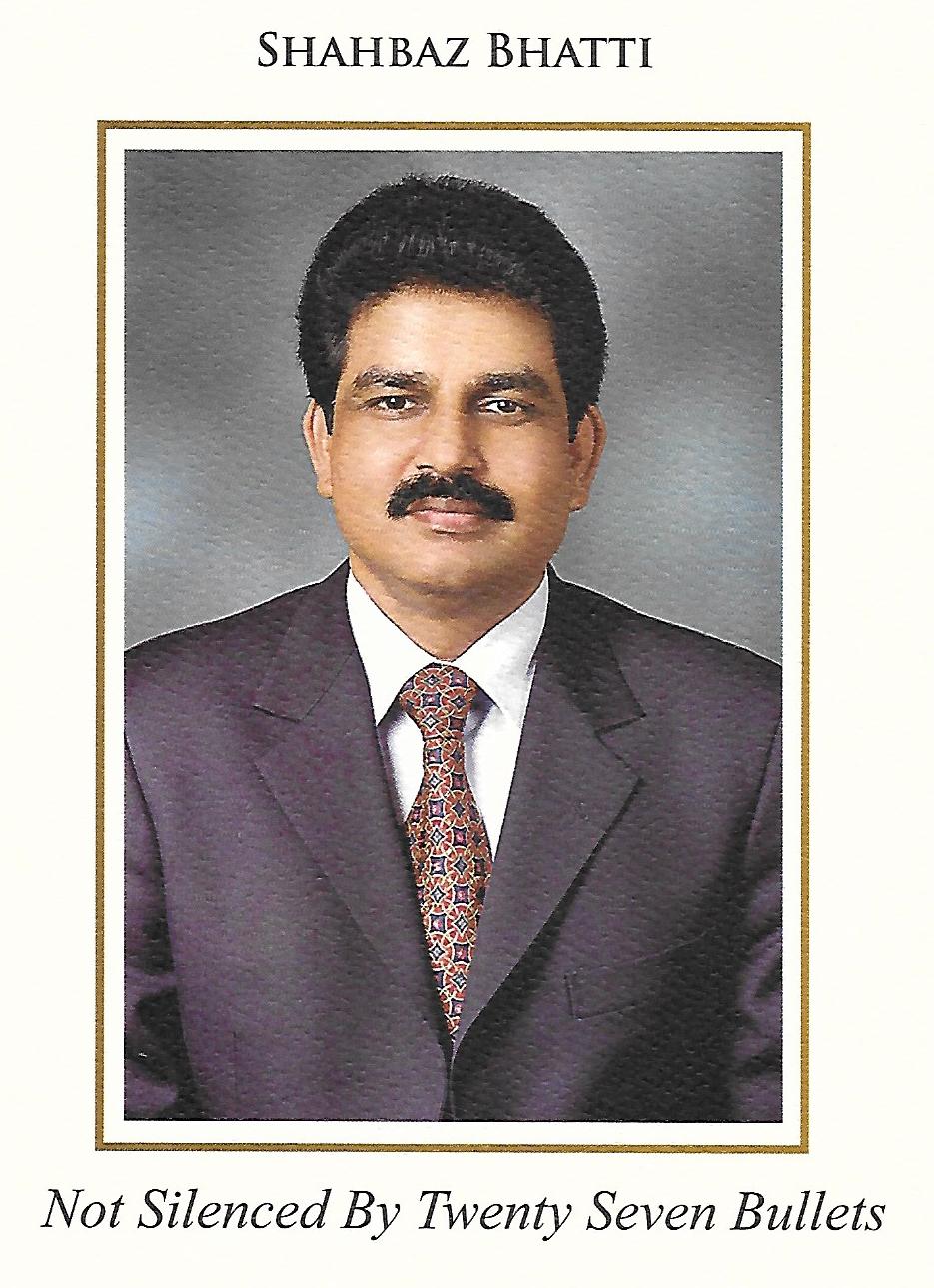
While taking evidence in South East Asia from Christians fleeing Pakistan I heard the story of Basil – a pastor’s son, who was burnt alive after refusing to convert.
Or think of Iran where Saeed Abedini, was imprisoned for 10 years for “undermining national security” by hosting Christian gatherings in his home.
Or China, where Catholics like Bishop Cosmas Shi Enxiang, who died last year aged 94, spent half his life in prison; where Protestants, since the beginning of 2016, have seen 49 of their churches defaced or destroyed, crosses removed and a pastor’s wife crushed to death in the rubble as she pleaded with the authorities to desist.
Think, of countries like Sudan and Nigeria.
In Sudan, Meriam Ibrahim, – a young mother of two was charged, and sentenced to death for apostasy and to 100 lashes for adultery. Refusing to renounce her faith, and before being freed, she was forced to give birth shackled in a prison cell.
Meanwhile, Sudan’s leaders, indicted by the International Criminal Court for genocide, continue to bomb and use chemical weapons in Darfur and to bomb Christian communities in South Kordofan and Blue Nile.
In Nigeria, think of the 200 schoolgirls abducted in Chibok by Boko Haram who bomb churches and target believers stating that their declared aim is to eradicate Christianity.
Or North Korea – where I have been four times.
The United Nations says its egregious human rights violations make it a “State without parallel” where 200,000 are incarcerated; that along with executions and torture “there is an almost complete denial of the right to freedom of thought, conscience and religion” and that “Severe punishments are inflicted on people caught practising Christianity”.
One Christian escapee, Hae Woo, told me that torture and beatings are routine, that prisoners were reduced to eating rats, snakes, or even searching for grains in cow dung: “the dignity of human life counted for nothing.”
So that’s the reality check.
3. How we should respond; what we might do?
We need a consistent, coherent international strategy.
At every opportunity we must wake up the world to the scale of the persecution and to the obligations that flow from both Article 18 and the Genocide Convention.
However long it takes, we have a duty to bring to justice those responsible for their crimes against humanity.
In the UK we have designated a day in November as “Red Wednesday” to commemorate the persecuted. The Houses of Parliament and other public buildings and churches were lit reed, people worse an item of red clothing, and Facebook pages were lit red. It should be replicated around the world.
Perhaps we also need a new Convention on Religious Freedom but if we promote such Conventions let’s dedicate ourselves to upholding and enforcing them too – and with universal application – making sure that words like genocide, persecution and discrimination are matched by deeds and are reflected in the way we do business with; sell arms to; or provide aid programmes to those who violate Article 18.
We must promote religious literacy among policy makers and the population at large. Given that 84% of the world’s population declare a religious faith policy makers cannot understand the world if you do not understand religion.
We must emphasise the tangible benefits that accrue to societies that protect religious freedom. A society which promotes religious freedom will be enlivened and enriched and one that does not will decay
People of faith and of no faith must also enter into one another’s stories – and we need to speak up far more passionately and clearly about the suffering of the household of faith.
We urgently need a persuasive new narrative capable of forestalling the unceasing incitements to hatred which pour forth from the internet;
We are failing to counter this with common perspectives, common ethical ideals of and underlining how we can learn to live together.
The urgency of the life and death task facing this conference was starkly underlined by the execution of the 84-year-old French priest Fr. Jacques Hamel and by the murder of the Glasgow shopkeeper, Asad Shah, an Ahmadi who often reached out to Christian neighbours and customers and was murdered by an islamist for doing so.
Let me end.
We must wake up to these realities and use the freedoms with which we have been blessed to speak for those who are not so fortunate. It was Dietrich Bonhoeffer, executed by the Nazis, who said that “Silence in the face of evil is itself evil…not to speak is to speak. Not to act is to act.”
If, for so many, our Christian faith is worth dying for, for us is should be worth living for.
And we have the freedom and the duty to do so.
So let us commit to break the silence and to act and be fearless advocates on behalf of the suffering crucified Church.

============================================================================
Carnage at Westminster – as parliamentarians hear from some of those who face terror every day of their lives
Link to Milton Lecture on Protecting Fundamental Freedoms Whilst Combating Hate:
Business Not Quite As Usual
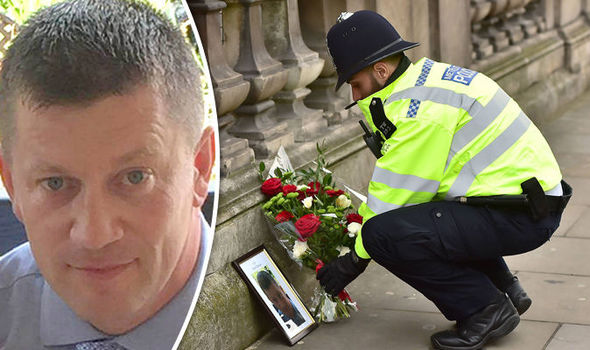
Police Constable Kevin Palmer Murdered in the Westminster Precinct
In her Statement, in the aftermath of the attack at Westminster, the Prime Minister defiantly insisted that parliamentary business would today continue as usual.
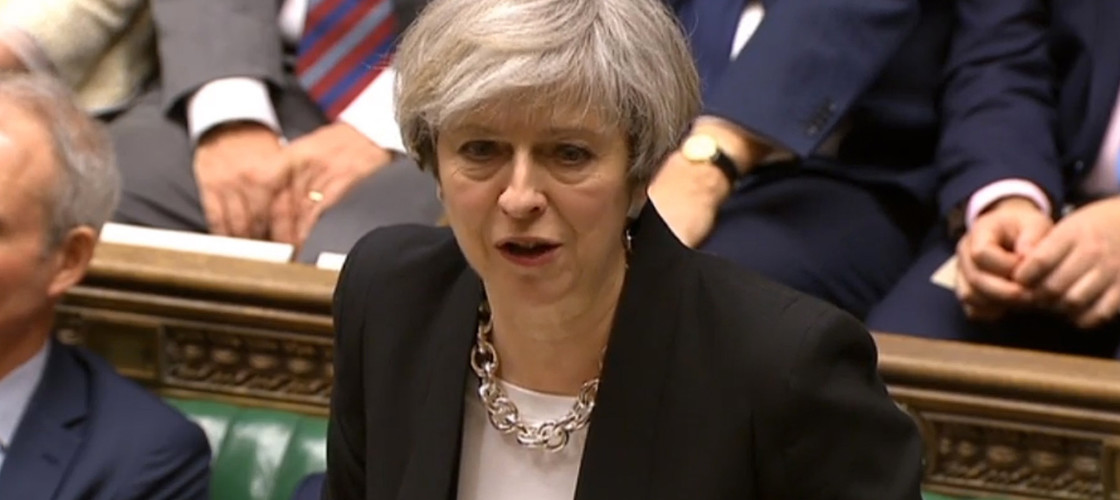
The Prime Minister
During the morning sittings in both Houses, there was a united and wholly unambiguous message that those who would destroy our democracy and fundamental freedoms will not succeed. But in the sombre atmosphere that inevitably prevailed, it wasn’t quite business as usual.
And we always need to remind ourselves that this is not the first, and will not be the last attack on Westminster – both on the buildings and on the values which are its foundation stones.
Nearly forty years ago, on March 30th 1979, on the day after I was elected to the House of Commons in a by-election, Airey Neave was murdered by the Irish National Liberation Army, blown up just yards from where P.C. Keith Palmer – a father-of-two and a member of the Parliamentary and Diplomatic Protection Squad – was yesterday murdered by an Islamist terrorist.
Keith had worked at Westminster for fifteen years and he was one of our gallant band of men and women who protect us and every day greet us, and endless visitors, with great courtesy but who also know that Westminster is far more than a tourist attraction.
It is an iconic building that stands for democracy and freedom and is therefore bound to be a target for those who wish to destroy those things and impose hate driven ideologies.
P.C.Palmer’s body lay just yards from the entrance to Westminster Hall – which was subjected to Nazi bombs at the height of World War Two.
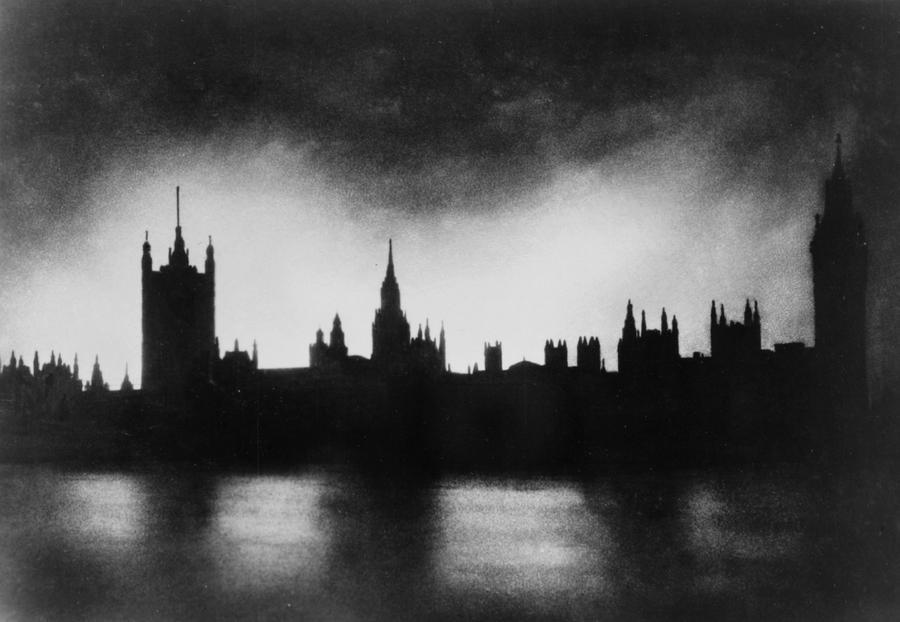
Westminster silhouetted by the light of fires caused by Nazi bombs
In 1940 a high explosive bomb fell into Old Palace Yard. In 1941 an incendiary hit the Victoria Tower and a police sergeant showed great courage when he climbed the scaffold and extinguished the burning magnesium with a sandbag. Then the western courtyard was hit and two auxiliary policemen were killed.
Next, the Commons Chamber was hit along with Westminster Hall – built by William Rufus in 1097. As the Commons burnt, firemen with axes broke down the doors of the Hall and as the medieval rafters burnt they pumped in water from the Thames to save the Hall.
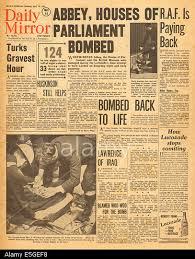
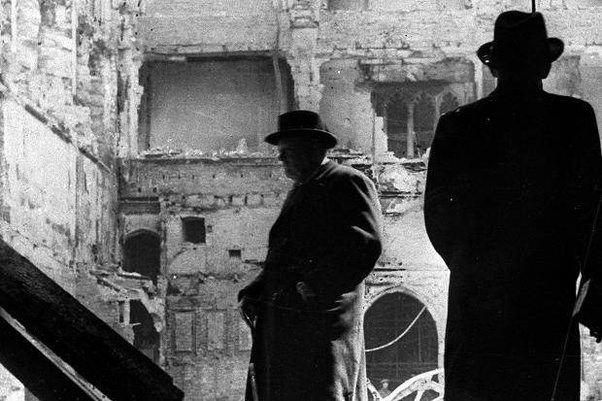
Westminster was bombed by the Nazis – the House of Commons was destroyed.
P.C.Palmer stands in a long and heroic tradition of extraordinary bravery placed at the service of their country.
If the walls of Westminster Hall could speak they could tell this nation’s history – of its struggles for political and religious freedom, its belief in human rights and its belief in the rule of law.
From its construction in 1097, and the first meeting of Parliament in 1265, to the trials of William Wallace in 1305, of St.Thomas More in 1535, and Charles I in 1649, to the lying-in-state of Kings, Queens and Prime Ministers, there is little that this Hall could not tell us about who we are and what we stand for as a nation.
My first visit to Westminster Hall was as in 1965, as a school boy, when we came to pay our respects to Sir Winston Churchill whose body had been brought to the Hall – and whose leadership saw this country through its darkest hours.
Yesterday, after being locked down for several hours in Central Lobby many of us were taken into the Hall – where hundreds of people waited as events continued to unfold.
Here were Peers, MPs, secretaries, researchers, ancillary and catering staff and visitors to the House– the complete diverse mix that makes up the Westminster community on any working day.
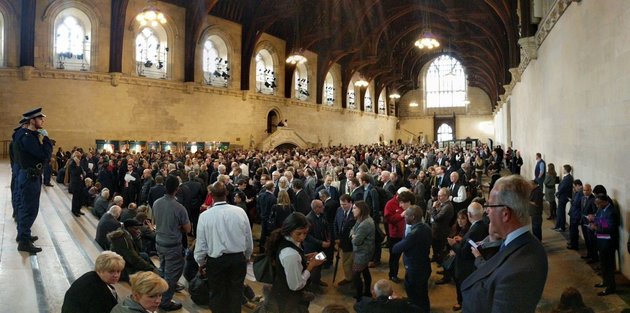
Peers, MPs, Staff and Visitors Congregated in Westminster Hall
I wondered what some of the school children, who had been singing songs to keep up their spirits, would make of this their first visit to Westminster. Beyond the tragedy I hope they will be inspired and realise that in every generation the baton must pass to the one which follows.
As the attack was taking place I was meeting with the Egyptian Coptic Bishop, Angaelos. A few months ago he had spoken in Westminster Hall at the annual parliamentary prayer breakfast.
During our meeting we had been talking about recent attacks on his church community – many driven out by ISIS killers from the Sinai Peninsula. We talked about the Copts who had been murdered by ISIS in Libya – who went to their deaths refusing to renounce their faith. We were recalling that the last time we had been together was to stand outside Westminster Abbey at a service of remembrance to mark the deaths of 25 people at Cairo’s Cathedral of St.Mark.
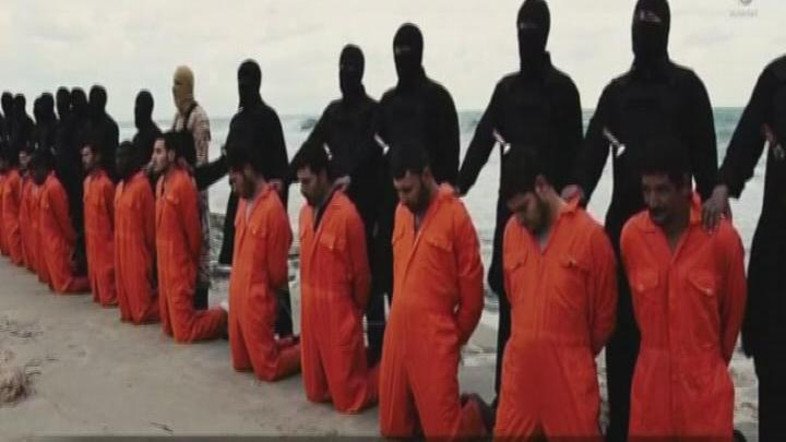
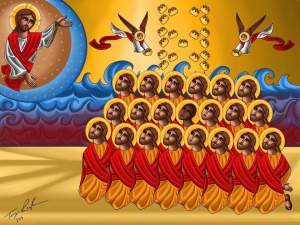
Coptic Christians Executed By ISIS
Then, interrupting our conversation, one of our Doorkeepers urgently asked us to follow him – and he took us to Central Lobby. Among many we spoke to there was Lord Tebbit – who in 1984 had survived the Brighton bomb and whose dear wife Margaret had been paralysed by the attack.
Bishop Angaelos and I spent five hours in the lockdown in Central Lobby and in Westminster Hall. Horrible, but nothing in comparison with what happened to those who were killed, maimed or wounded.
At 4.00pm I had been due to chair a meeting on North Korea and I still don’t know if anyone hoping to come into the House for that hearing was hurt but I do know that South Koreans were among the casualties on Westminster Bridge. The intended speaker, who had escaped from North Korea, and his translator, sent me a text to say that they had got safely away.
This morning I arrived at the House at 7.30 am to prepare for a meeting I was due to chair on the Committee Corridor about the plight of Christians in Erbil, and who had escaped from ISIS genocide in Iraq and Syria.
The meeting had been organised by the charity Aid to The Church In Need. They had flown over Mr Stephen Rasche, who heads the humanitarian and resettlement programmes for more than 70,000 displaced Christian families in northern Iraq.
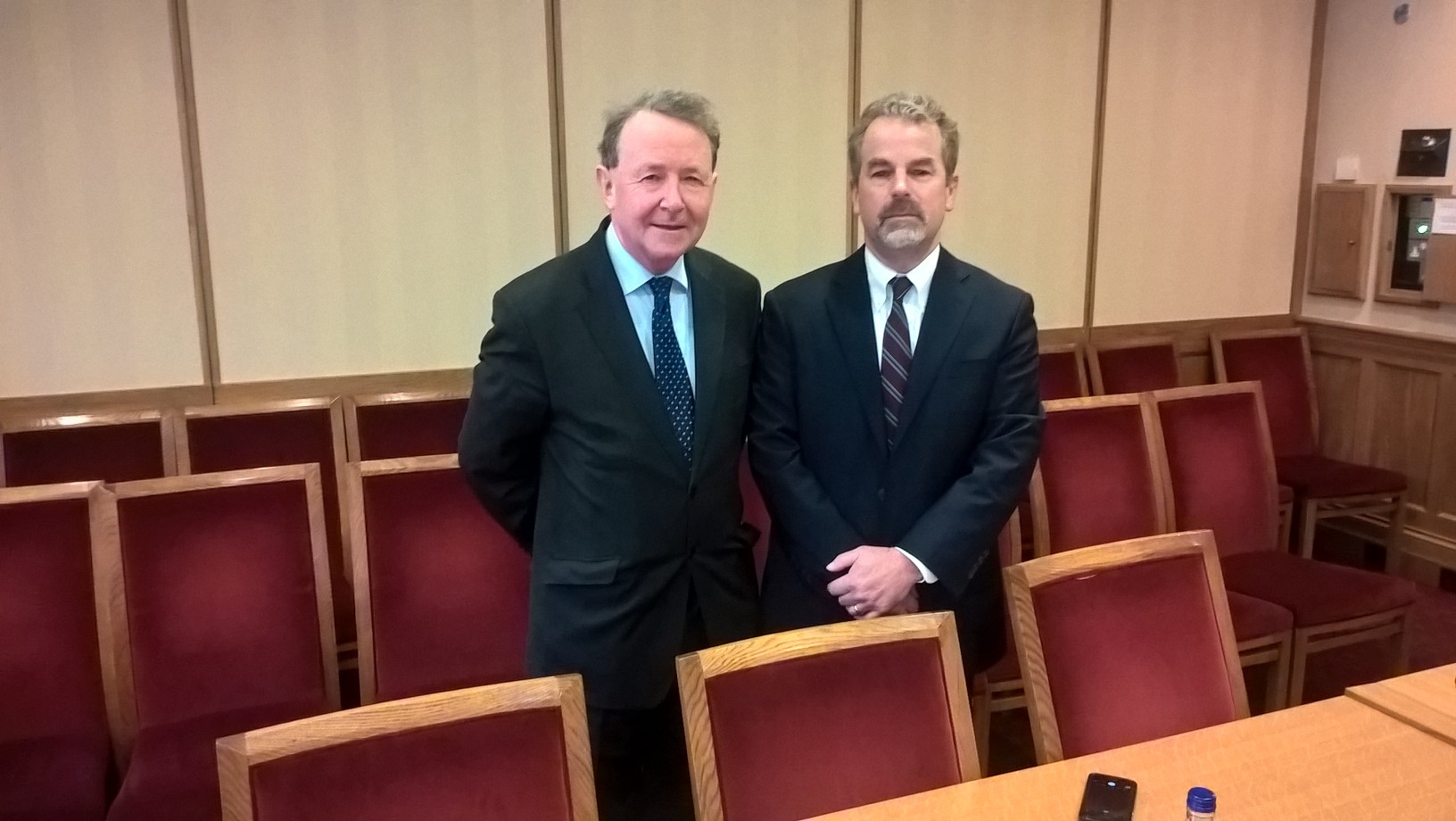
Stephen Rasche met with Parliamentarians, Ministers and Officials
Although we were unable to get members of the public into the building we went ahead with the meeting and Mr.Rasche spoke to Peers such as Baroness (Helena) Kennedy QC, Lord Hylton, and Lord Gordon and he met the DFID Minister, Lord Bates.
Mr.Rasche’s visit comes at a critical time for Christians in the wake of the expulsion of ISIS from the Nineveh Plains, the region of northern Iraq which for centuries had been home to Catholic and Orthodox communities as well as other minorities. What sort of message would it have sent to them if that meeting had to be cancelled because of Islamist terror on the streets of London?
It’s almost a year since the House of Commons voted to declare events in Iraq and Syria to be a genocide against Christians, Yazidis and other minorities.
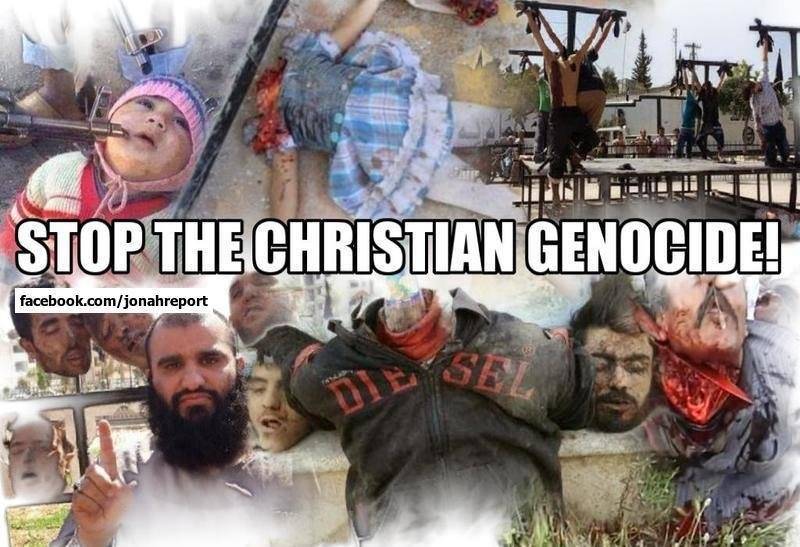
Stephen Rasche said that the programmes he organises on behalf of Chaldean Archbishop, Bashar Warda of Erbil, are running out of medicine, food – and hope. He described what it is like to live every day under the shadow of terror: “Christians are hanging on as a people – just barely” .
He pointed out that British aid simply doesn’t reach those we have declared to be the subject of genocide because the aid goes instead into UN camps in which the minorities would be too frightened to stay as many of those who persecuted them are in those very same camps.
Without help “medicine will run out in 40 days, food in two months.” Without help no-one from these ancient communities will be left: “we will become custodians of a caretaker culture.”
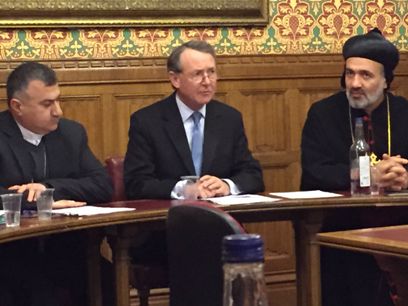
Archbishop Warda in Parliament in 2015
They are praying for the day when it will be safe to return to the Christian villages of Nineveh Plain and Mosul – but meanwhile they are a people whose story is written in mass graves, enslavement, rape and torture.
Yesterday, London had a glimpse of the brutality and unforgiving hatred that fuels this global ideology.
But, as Justin Welby, the Archbishop of Canterbury, reminded us when we assembled in the House later in the morning, hatred need not win.
Westminster has withstood far worse, and in displaying traditional British stoicism and resilience, Parliament must also inspire and encourage beleaguered communities, the world over, by displaying leadership and determination in resisting those who would destroy the values for which P.C.Palmer gave his life.
David Alton (Lord Alton of Liverpool) is an Independent Crossbench Peer.
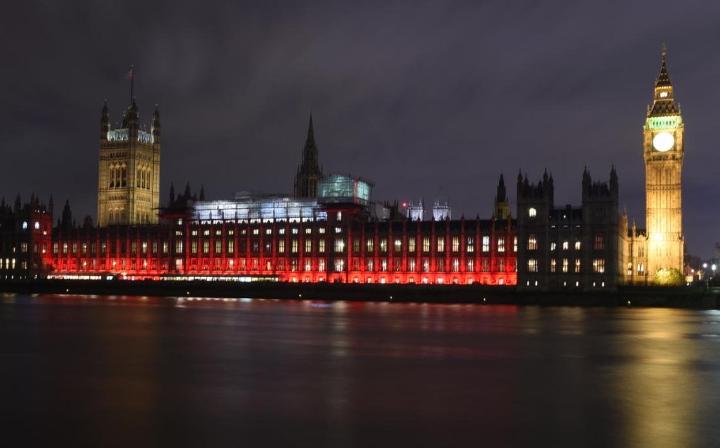
The Houses of Parliament lit in red on “Red Wednesday”, November 2016, to commemorate all those who have died or are persecuted for their religious beliefs.
============================================================================
Palm Sunday and Easter Attacks On Egypt’s Copts “ISIS’s “favourite prey”
Nina Shea of the Hudson institute says the position of Egypt’s Copts “ is very serious. We did a mapping of Salafi groups and found there are scores there. Isis has a beach head in north Sinai and appeal throughout the country. The military is corrupt and incompetent, assuming it even wants to protect the Copts.
“Iraqi Church leaders now tell us there are less than 200,000, maybe as few as 100,000 Christians left in all Iraq. They’ve been decimated, down from 1.4 million. Baghdad contributes to their plight and the West has cruelly abandoned them.”
Unless the World wakes up to this the Copts will be subjected to the same genocide that has been unleased on the minorities of Iraq and Syria. In a recent video, ISIS threatens to make the targeting of that two thousand year old community its priority, chillingly calling the Copts its “favorite prey.”
Recent Questions in parliament:
Baroness Anelay of St Johns, the Foreign and Commonwealth Office, has provided the following answer to your written parliamentary question (HL6512):
Question Lord Alton of Liverpool:
To ask Her Majesty’s Government what assistance they have offered the government of Egypt to protect Egypt’s Coptic population from ISIS, following reports of targeted attacks, killings, and forced conversions. (HL6512)
Tabled on: 03 April 2017
Answer:
Baroness Anelay of St Johns:
We are concerned about recent attacks in both Cairo and North Sinai against the Coptic Christian community, claimed by Daesh. The Government of Egypt has reaffirmed its commitment to protecting the rights of minorities and to the need for religious tolerance. We welcome President Sisi’s consistent calls for peaceful coexistence and the Government of Egypt’s expression of support for the rights of Christians and for religious tolerance.
As part of our UK-funded projects and programmes in Egypt we are providing counter-terrorism assistance to the Egyptian authorities and counter-IED training for the Egyptian security forces. We are committed to supporting the Egyptian Government’s fight against terrorist groups, including those who seek to target minority groups such as Coptic Christians.
Date and time of answer: 19 Apr 2017 at 16:06.
Lord Alton of Liverpool Crossbench
To ask Her Majesty’s Government what assessment they have made of reports of Coptic Christian families in Egypt who have been forced to flee North Sinai province following a number of killings in recent weeks by suspected Islamist militants; and what representations they have made to the government of Egypt about those reports.
- Hansard source(Citation: HL Deb, 20 March 2017, cW)
Baroness Anelay of St Johns Minister of State, Deputy Speaker (Lords)
We deplore all discrimination against religious minorities and constraints on their freedom to practise their faith. The Egyptian constitution contains protections for freedom of religious belief and it is important that these rights are respected.
The UK Government continues to work closely with the Egyptian authorities on security and counter-terrorism, including through training Egyptian officers who operate in areas such as North Sinai to counter improvised explosive devices used by Islamist militants.
We have regularly raised our concerns about the deterioration in the human rights situation with the Egyptian Government, including issues affecting Christians. We have also raised our broader concerns around the rights to freedom of expression, association and assembly, which are essential to improving the protection of freedom of religious belief in Egypt.
Lord Alton of Liverpool Crossbench
To ask Her Majesty’s Government what offers of help or advice they have made to the government of Egypt about the improvement of security of the people attending places of worship following the bombing of the Coptic Orthodox Cathedral of St Mark in Cairo; and what assessment they have made of the levels of persecution and discrimination against the Coptic minority.
- Hansard source(Citation: HL Deb, 23 December 2016, cW)
Baroness Anelay of St Johns Minister of State, Deputy Speaker (Lords)
Following the attack against El-Botrosiya Church on 11 December, the Prime Minister, my Rt Hon. Friend the Member for Maidenhead (Mrs May) wrote to the President of Egypt to express her deep condolences and reiterate the UK’s support for Egypt in its fight against terrorism. The Foreign Secretary, my Rt Hon. Friend the Member for Uxbridge and South Ruislip (Boris Johnson), Her Majesty‘s Ambassador to Egypt, and officials in London have also expressed their condolences to the Egyptian authorities. The UK Government continues to work closely with the Egyptian authorities on security and counter-terrorism, including through training Egyptian officers in countering improvised explosive devices and close protection.
The UK Government has been clear that freedom of religious belief needs to be protected and that the ability to worship in peace is a vital component of a democratic society. We are concerned about recent reports of sectarian violence in Egypt, and welcome President Sisi’s consistent calls for peaceful coexistence and the government of Egypt’s expression of support for the rights of Christians and for religious tolerance.
————————————————————————————————————————————-
Hudson Center for Religious Freedom Senior Fellow Samuel Tadros is an expert analyst on his native Egypt and Islamist extremism. A Coptic Christian, himself, he has personal experience with the persecution now being waged by ISIS against that community in Egypt, having had friends and relatives among the survivors of recent deadly church bombings, including the one earlier this week, on Palm Sunday, at St. George’s Orthodox Church, in Tanta, Egypt. In a recent video, ISIS threatens to make the targeting of that two thousand year old community its priority, calling the Copts its “favorite prey.”
Sam’s extraordinary reflection, at the bottom of this message, appears in The Atlantic and provides poignant insights into the plight of the Copts.
Time
http://time.com/4732357/isis-coptic-christians-palm-sunday-egypt-bomb/
“If you’re a Coptic Christian in Egypt today, you’re now asking many questions,” said Samuel Tadros, a senior fellow at the Washington-based Hudson Institute who writes frequently on sectarian relations in Egypt. “What has the state done, why are we being targeted, am I safe any longer and should I leave Egypt.”
Bloomberg
“The bombings were ‘a mixed bag’ for El-Sisi, said Samuel Tadros, a senior fellow at the Hudson Institute in Washington.
‘On the one hand it reinforces his narrative that Egypt is in war against terrorism, rallying the nation around the flag and so forth,’ Tadros said. ‘At the same time the attacks send a message of incompetence of the security apparatus’ in containing the militancy, he said.
If the jihadist group proves able to operate more extensively outside of Sinai, ‘that would be a very dangerous development,’ he added.”
Canadian Broadcasting Corporation: Transcript of Radio Interview
Excerpt: “ [The Copts] face discriminatory policies at the hands of the government. Discrimination in laws and government appointments. Restrictions in building churches and they face exclusion and discrimination in society at large and incitement against them by Islamists as well as these attacks. Copts have special place in Islamist doctrines. Perhaps this is a reflection of the fact that they are more than 50 percent of the Christian presence in the Middle East as a whole. Perhaps it’s a reflection of the disproportionate number of Egyptians that plays an instrumental role in the formation of Islamist groups or the Islamist narrative. I mean it’s a war. Why they’re targeted? It is for who they are. Islamic State has released a 30 minute video after the December bombing of the cathedral complex in Cairo where they collaborated. It’s not about anything that individuals Copts have done. They basically call them the Worshipers of the Cross. These are by their very existence warriors against Islam. And thus every single Copt is a possible target.”
FoxNew.com: Quoted by Judith Miller:
http://www.foxnews.com/opinion/2017/04/11/judith-miller-trump-egypt-and-future.html
“Samuel Tadros, of Hudson Institute’s Center for Religious Freedom, estimates that there have been at least 100 major attacks on Christians and their churches since [Pres. Sisi] came to power.”
Huffington Post
“Samuel Tadros, scholar of Middle Eastern Studies at the Hudson Institute, has written “Motherland Lost: The Egyptian and Coptic quest for modernity” (Hoover Institution Press, 2013). He explains in an interview that 90 percent of his Facebook friends ask him how they can leave the country. ‘Not everyone will leave, but everyone is contemplating it,’ says Samuel Tadros. ‘My parents have nobody left to take care of them’. Out of his own Coptic family, half of them live outside of Egypt. There were two Coptic churches in the US in 1970. In 2012, the number had increased to 202. That speaks volumes.
https://www.theatlantic.com/international/archive/2017/04/copt-attacks-egypt-isis-sinai/522735/
What Palm Sunday Means to Egypt’s Copts
Christianity was born in pain in the country. An attack on a holy day is another bloody symbol of its beginnings.
O-sana va-sili too Esraeel
At Saint George Church, a Coptic church in Tanta, Egypt, the deacons were finishing the final vowels in Evlogimenos (the Hosanna to the King of Israel), when the bomb exploded, leaving 28 worshipers dead and many others wounded. Shortly afterwards, a suicide bomber, failing to enter Saint Mark’s Cathedral in Alexandria, where the Coptic Pope was leading the liturgy, detonated his bomb outside the church, leaving 17 people dead. A joyful day, one where Coptic children compete to turn their palm fronds into the most beautiful of shapes, suddenly became the deadliest day of attacks on this ancient community.
The twin bombings were hardly the first attacks against Egypt’s Coptic Christians. Nor are they likely to be the last. In recent years, Copts, who constitute more than half of all Christians in the Middle East, have been setting the grisliest of records, with each new attack claiming more victims than the one before. The Islamic State has claimed credit for the recent bombings. Following its bombing in December of the Coptic Cathedral complex in Cairo, the group released a message promising more to come for the “worshipers of the cross,” the group’s name for the Copts. A week-long murder spree targeting Copts by ISIS in Northern Sinai in February nearly emptied the region of Christians. Bombing Coptic Churches just before Christmas and Easter, ISIS seemed to take particular delight in targeting Copts during their most joyful celebrations.
* * *
Blessed is the man You choose, and cause to approach You, that he may dwell in Your courts.
— Psalms 65:4
Palm Sunday is a day of contradictions in the Coptic calendar—a day of joy as the Lord enters Jerusalem, a day of preparation for a week of sorrows as the faithful follow Christ’s every step on the road to the cross. But the most extraordinary event occurs immediately after the liturgy. The deacons replace the red stoles on their tunics with darker ones, and the rite suddenly shifts from the joyful sha’aneen, (or, Hosanna), to a general funeral for all living Copts. The verses from Psalms 65 are followed by the Pauline Epistle from 1 Corinthians 15, which promises resurrection of the believers. As the Church fixes its gaze on the death of its savior, no funerals are held for Copts during Holy Week; the general funeral prayers on Palm Sunday are meant to bless all those who die.
Christianity was born in pain in Egypt, its message of hope bathed in blood. Fleeing persecution in Israel, the young Jesus found refuge in the country. Yet suffering and martyrdom would become the central features of the Church his disciples would found. Saint Mark the Evangelist, who introduced Christianity to Egypt, shed his blood on the streets of Alexandria, and countless Copts followed him as they clung to their faith in their redeemer in the face of endless persecution. That initial blow, struck by Roman Emperors, was the first of many. The names of rulers may have changed, from Roman and Byzantine emperors to Muslim caliphs and governors, discriminatory laws changed from the Muslim rules of Dhimmitude, to the exacting, oppressive laws of Egypt’s present-day rulers, but the nature of the Coptic plight has not.
Through it all, Copts clung to their church. As everything from employment opportunities to roster spots on soccer teams were closed to them, the church became more than a house of worship, providing health care, private education, even sports venues. A Coptic nation exists today—but it does not seek independence. Membership is based not on race, nor, after the loss of the Coptic tongue, on a distinct language or even purely on religion. Instead, Copts are bound by the unique history of a church, a history of suffering. Holy Week may be focused on the pain of Christ, but for the Copts, their pain is seen and felt through His. They have carried their redeemer’s cross on the way to Golgotha, just as they carry a tattooed cross on their arms.
* * *
Thok te ti-gom, nem pi-o-oo nem pi-esmo, nem pi-amahee sha eneh amen, Emmano-eel pen-nouti pen-oroo
This is perhaps the most beautiful of the Coptic hymns; the translation: “Thine is the power, the glory, the blessing, and the majesty, forever Amen. Emmanuel our God and our King.”
During Holy Week, as the Coptic Church’s congregation walks the Via Dolorosa (or, the Way of Suffering), weeping as lashes land on Christ’s back and his body is nailed to the cross, it reminds the faithful of His power and divinity. The cross was carried not in weakness, but in strength; it was not forced, but chosen. In His acceptance of pain, Copts see their own. Over the centuries, many non-believers have ridiculed them for their perceived weakness, wondering why they have not taken up arms or sought revenge.
But like its savior, the Coptic Church carries its cross with pride. The blood of the martyrs is the seed of the church, as Tertullian, the second-century theologian, proclaimed centuries ago. The years have taken their toll: Christianity was largely wiped out of North Africa; the places where Saint Augustine once walked no longer remember his name. Only in Egypt did it survive, the Church of Alexandria, the founding church of Copts, shining alone through Christianity’s early centuries. In Egypt’s deserts, monasticism was born at the hands of Saint Antony the Great, and it was Coptic Popes, from Athanasius to Cyril, who shaped the Christian creed and faith for the whole world.
During the Easter liturgy, a beautiful hymn is chanted, remarkably one of the few that are always recited in Arabic:
* * *
Ya kol al sofoof al sama-eyeen, ratelo le-eelahena be naghamat el-tasbeeh, wabe-tahegoo ma’na al-yowma fareheen, be-keyamat El-Sayed El-Maseeh
This hymn translates to, “All you heavenly orders, Sing to our God with the melody of praise, Rejoice with us today with gladness, In the Resurrection of the Lord Christ.” Death on the cross is followed by resurrection.
Such is the story of the Copts. While their church faces tremendous challenges in Egypt, it is flourishing abroad. In 1970, there were two Coptic Churches in the United States. Today there are 250. In sub-Saharan Africa, more than half a million Africans have joined the church, which is untainted by the legacy of colonialism, and prides itself as an African Church. There is a future for the Copts.
* * *
And it came to pass at the end of the four hundred and thirty years, even the selfsame day it came to pass, that all the hosts of the Lord went out from the land of Egypt.
—Exodus 12:41
I woke up early on Palm Sunday to the news of the bombings in Egypt. I entered my daughters’ room, hugged and kissed them and thanked God that they were born in America. I called my parents in Cairo to check on them. A distant relative was praying in the Alexandria Cathedral and had just left the church as the suicide bomber detonated his vest. His car windows were destroyed, but he was unharmed.
As we made our way to our local Coptic church in Fairfax Virginia, I noticed a police car parked out front. My moment of alarm was short-lived. I reminded myself that the local police were there not because of a bomb threat, but to organize traffic as Copts flock to the church during Holy Week. If the Coptic Church is suffering in its homeland, in America it is struggling to cope with the wave of immigration that has brought over half a million of us here and will continue to bring more.
The service was a very painful one. There were no happy faces in church. The deacon could barely continue reading the Bible through his tears. The priest reminded us of the blessings we enjoy in America as we prayed for our brethren back in Egypt. My wife’s sister sent us a nice picture of her son, a deacon, at the Palm Sunday service in Cairo. I saw a picture of a similarly aged boy, also a deacon, who people on social media said was one of the victims. For the rest of the day, I could not shake the picture from my mind. On Facebook, a friend in Cairo shared how, during the liturgy, before hearing the news, she thought it was a blessing that her daughter hadn’t made it to church that day. In case there was a bomb, at least her daughter would live.
It may well be time for Copts to pack their bags, close their churches, and bid farewell to 2,000 years of Christianity in Egypt. Will the Copts follow the Jews, both ancient and modern, kicked out of Egypt at the hands of Gamal Abdel Nasser? Where would they go? Who would take them? These are depressing questions, ones that Coptic parents in Egypt are confronting. Leaving, it seems, is inevitable.

